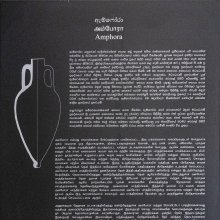Sanatha, Sanātha, Sanāthā: 13 definitions
Introduction:
Sanatha means something in Hinduism, Sanskrit, the history of ancient India, Marathi, Hindi. If you want to know the exact meaning, history, etymology or English translation of this term then check out the descriptions on this page. Add your comment or reference to a book if you want to contribute to this summary article.
Alternative spellings of this word include Sanath.
Images (photo gallery)
In Hinduism
Kavya (poetry)
Source: Brill: Śaivism and the Tantric Traditions (kavya)Sanātha (सनाथ) [=Sanāthī?] refers to “having protected”, according to Bāṇa’s Kādambarī (p. 224-228).—Accordingly, “[Then he notices the dvārapāla (guardian of the gate), about which it is said that] [Caṇḍikā] had protected (sanātha—sanāthīkṛtadvāradeśām) her entrance with an iron buffalo installed in front, which, because of the fact that it had been marked by palms [dyed with] red-sandalwood, seemed to have been stamped by Yama’s hand-prints red with blood, the red eyes of which were being licked by jackals greedy for drops of blood”.

Kavya (काव्य, kavya) refers to Sanskrit poetry, a popular ancient Indian tradition of literature. There have been many Sanskrit poets over the ages, hailing from ancient India and beyond. This topic includes mahakavya, or ‘epic poetry’ and natya, or ‘dramatic poetry’.
Purana and Itihasa (epic history)
Source: archive.org: Shiva Purana - English TranslationSanāthā (सनाथा) refers to “she who has a husband”, according to the Śivapurāṇa 2.3.51 (“The resuscitation of Kāma”).—Accordingly, as Rati said to Śiva: “[...] O lord Śiva, in the great festival of your marriage, all people are happy. I alone am unhappy without my husband. O lord, make me possessed of my husband (sanāthā). O Śiva, be pleased. O lord, friend of the distressed, please make your words true. Excepting you, who is there in the three worlds including the mobile and immobile creatures who can destroy my sorrow. Knowing this, be merciful. [...]”.

The Purana (पुराण, purāṇas) refers to Sanskrit literature preserving ancient India’s vast cultural history, including historical legends, religious ceremonies, various arts and sciences. The eighteen mahapuranas total over 400,000 shlokas (metrical couplets) and date to at least several centuries BCE.
India history and geography
Source: Cologne Digital Sanskrit Dictionaries: Indian Epigraphical GlossarySanātha.—(IA 7), wrongly supposed to mean ‘one whose father is alive’ or ‘a worthy’; actually, a personal name. Note: sanātha is defined in the “Indian epigraphical glossary” as it can be found on ancient inscriptions commonly written in Sanskrit, Prakrit or Dravidian languages.

The history of India traces the identification of countries, villages, towns and other regions of India, as well as mythology, zoology, royal dynasties, rulers, tribes, local festivities and traditions and regional languages. Ancient India enjoyed religious freedom and encourages the path of Dharma, a concept common to Buddhism, Hinduism, and Jainism.
Languages of India and abroad
Marathi-English dictionary
Source: DDSA: The Molesworth Marathi and English Dictionarysanātha (सनाथ).—a (S) That has a lord, master, patron, friend, protector. sanāthā f S A woman whose husband is living.
Marathi is an Indo-European language having over 70 million native speakers people in (predominantly) Maharashtra India. Marathi, like many other Indo-Aryan languages, evolved from early forms of Prakrit, which itself is a subset of Sanskrit, one of the most ancient languages of the world.
Sanskrit dictionary
Source: DDSA: The practical Sanskrit-English dictionarySanātha (सनाथ).—a.
1) Having a master, lord or husband; त्वया नाथेन वैदेही सनाथा ह्मद्य वर्तते (tvayā nāthena vaidehī sanāthā hmadya vartate) Rām.
2) Possessed of a guardian or protector; सनाथा इदानीं धर्मचारिणः (sanāthā idānīṃ dharmacāriṇaḥ) Ś.1; सनाथः संवृत्तः (sanāthaḥ saṃvṛttaḥ) V.5.
3) Occupied by, possessed by.
4) Provided or furnished with, having, possessing, endowed with, full of; usually in comp.; लतासनाथ इव प्रतिभाति (latāsanātha iva pratibhāti) Ś.1; शिलातलसनाथो लतामण्डपः (śilātalasanātho latāmaṇḍapaḥ) V.2; Meghadūta 1; Kumārasambhava 7.94; R.9. 42; V.4.1.
5) Crowded (as an assembly).
-thā A woman whose husband is living.
Source: Cologne Digital Sanskrit Dictionaries: Shabda-Sagara Sanskrit-English DictionarySanātha (सनाथ).—f.
(-thā) A woman whose husband is living. E. sa for saha with, nātha husband.
Source: Cologne Digital Sanskrit Dictionaries: Benfey Sanskrit-English DictionarySanātha (सनाथ).—I. adj. endowed, [Pañcatantra] 76, 18. Ii. f. thā, a woman whose husband is living.
Sanātha is a Sanskrit compound consisting of the terms sa and nātha (नाथ).
Source: Cologne Digital Sanskrit Dictionaries: Cappeller Sanskrit-English DictionarySanātha (सनाथ).—[adjective] having a master or protector; well protected by ([instrumental] or —°); occupied by, connected or endowed with ([instrumental] or —°).
Source: Cologne Digital Sanskrit Dictionaries: Monier-Williams Sanskrit-English Dictionary1) Sanātha (सनाथ):—[=sa-nātha] [from sa > sa-nanda] mfn. having a master or protector, protected by ([instrumental case] or [compound]), [Kāvya literature; Purāṇa]
2) [v.s. ...] having a lord or husband (ā f. ‘a woman whose husband is living’), [cf. Lexicographers, esp. such as amarasiṃha, halāyudha, hemacandra, etc.]
3) [v.s. ...] filled with persons, crowded (as an assembly), [Śāntiśataka] [Scholiast or Commentator]
4) [v.s. ...] occupied by, possessed of. possessing, furnished or endowed with ([instrumental case] or [compound]), [Kāvya literature; Purāṇa; Pañcatantra] etc.
Source: Cologne Digital Sanskrit Dictionaries: Yates Sanskrit-English DictionarySanāthā (सनाथा):—[sa-nāthā] (thā) 1. f. A woman whose husband is living.
[Sanskrit to German]
Sanskrit, also spelled संस्कृतम् (saṃskṛtam), is an ancient language of India commonly seen as the grandmother of the Indo-European language family (even English!). Closely allied with Prakrit and Pali, Sanskrit is more exhaustive in both grammar and terms and has the most extensive collection of literature in the world, greatly surpassing its sister-languages Greek and Latin.
Hindi dictionary
Source: DDSA: A practical Hindi-English dictionarySanātha (सनाथ) [Also spelled sanath]:—(a) having a patron/protector/guardian/husband; gratified/fulfilled; —[karanā] to provide protection; to fulfil, to gratify.
...
Kannada-English dictionary
Source: Alar: Kannada-English corpusSanātha (ಸನಾಥ):—[adjective] having a master, guardian or care-taker.
--- OR ---
Sanātha (ಸನಾಥ):—
1) [noun] the fact of having a master, guardian or care-taker.
2) [noun] a man who has a master, guardian or care-taker.
Kannada is a Dravidian language (as opposed to the Indo-European language family) mainly spoken in the southwestern region of India.
See also (Relevant definitions)
Partial matches: Natha, Sha, Ca.
Starts with: Canatanan, Canatanatarmam, Canattanam, Sanatanam, Sanathan, Sanathata, Sanathate, Sanathatva.
Ends with (+16): Ashanatha, Ashtadashanatha, Cakrishanatha, Divasanatha, Gorakshanatha, Hamsanatha, Kailasanatha, Koshanatha, Kroshanatha, Kumbhinasanatha, Kusumasanatha, Lakshmisanatha, Lakulishanatha, Mahishanatha, Meshanatha, Mitreshanatha, Mitrishanatha, Murtisanatha, Nisanatha, Oddishanatha.
Full-text: Sanathata, Sanathya, Lakshmisanatha, Sanathate, Sanathatva, Duradarshana, Murtisanatha, Kusumasanatha, Sanathikri, Sanath, Sanathikar, Vrittakautuka, Dhurta, Natha, Kautuka.
Relevant text
Search found 5 books and stories containing Sanatha, Sa-nātha, Sa-natha, Sa-nāthā, Sa-nāthā, Sanātha, Sanāthā, Sanāthā; (plurals include: Sanathas, nāthas, nathas, nāthās, Sanāthas, Sanāthās). You can also click to the full overview containing English textual excerpts. Below are direct links for the most relevant articles:
Brihad Bhagavatamrita (commentary) (by Śrī Śrīmad Bhaktivedānta Nārāyana Gosvāmī Mahārāja)
Verse 1.5.129 < [Chapter 5 - Priya (the beloved devotees)]
Bhajana-Rahasya (by Srila Bhaktivinoda Thakura Mahasaya)
Text 11 < [Chapter 3 - Tṛtīya-yāma-sādhana (Pūrvāhna-kālīya-bhajana–niṣṭhā-bhajana)]
Jnaneshwari (Bhavartha Dipika) (by Ramchandra Keshav Bhagwat)
Verse 18.55 < [Chapter 18 - Moksha-sannyasa-yoga]
Later Chola Temples (by S. R. Balasubrahmanyam)
Temples in Srirangam < [Chapter II - Temples of Kulottunga I’s Time]
Śrī Kṛṣṇa-karṇāmṛtam (by Śrīla Bilvamaṅgala Ṭhākura)


